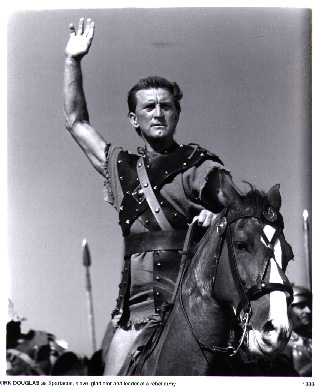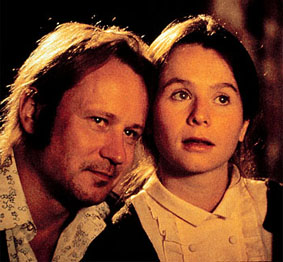Review Revue
Being break, I've been watching a bunch of films.On March break, I watched a string of absoultely phenomenal films. I loved practically everything I watched. On this break, I have not been so lucky, I've seen some good films, but everything I've watched has its flaws.
subUrbia
This is the only Richard Linklater film I had not seen, largely because it has not been released on DVD. However, the library had the VHS, so I broke one of my major rules and watched a pan and scan presentation of the film. Despite those bad viewing conditions, I was pleasantly surprised by this film, and feel like it's a major piece of the Linklater canon. Linklater's films are notoriously talky, so it's appropriate that he should adapt a play.
The film touches on a lot of classic Linklater themes, chronicling the existence of a group of high school friends, who still live in the town where they grew up, even as they long for something better. It's quite similar to Slacker in that everyone talks big, but always ends up just talking, never doing. The film resonated for me because I am in a similar situation as the characters are, and even though I am going to college, that doesn't change the fact that I'm basically just hanging around. 
These people are contrasted with their high school friend, Pony, who has made it big with his band, and is touring. They first sort of skirt around the issue of his success, but eventually it comes to the surface and the other characters are forced to confront their own lack of progress when they see how much Pony has done. Linklater is the master of talky films, and he gets great performances from his cast here, and keeps things interesting despite the fact that not that much happens in the film. I think it does a good job of capturing real life dynamics between friends and people who are drifting away. I'd imagine Linklater felt a lot of what Pony did when he returned home as a successful filmmaker. I feel like Linklater has a better handle on what my generation and the people slightly older than me are going through, and his films reflect the reality of our lives.
Miller's Crossing
I also watched the Coens' Miller's Crossing. Now, this is a film that has been quite acclaimed, with some people calling it their best. I don't know, but I just didn't like this film. I didn't feel the inventiveness and energy that is present in the Coens' other films, and it reminded me a lot of Richard Linkler's really weak Newton Boys. Both films seem to use a period setting as an excuse for not doing anything else interesting visually or with the narrative. This film was just a series of extended dialogue scenes as we moved through a whole bunch of double crosses that don't really lead anywhere. I didn't like the lead character, Tom, and tommy guns and fedoras alone cannot save a film. I really feel like I missed something with this film, because I don't understand how it could be so acclaimed. Perhaps in a few years, I'll give it another look, but for now, it goes in the bad column.
The Last Temptation of Christ
This is a film I've been wanting to see for a while, ever since I saw the X-Files episode, Amor Fati. This was an episode written by David Duchovny as an homage to Last Temptation, and it's arguably the best episode of the series, as well as one of the most interesting symbolic narratives I've ever seen. It took me five years , and two library checkouts to finally see the film, and it was a bit of a letdown after all that. The idea behind the film is to show Jesus' human side, his weakness and temptation, but the central piece, a fantasy sequence in which he marries Mary Magdalene is a very small piece of the film.
The vast majority of it is a fairly standard Jesus biography. I know that story so it wasn't too exciting to see all those scenes acted out again. I know about the water into wine, I know about Lazarus, and that stuff takes the focus away the film's core. The movie is too long, at 163 minutes. At least 20 minutes could have been cut out without hurting the story. And, the fantasy sequence is too short, that's the core of the film, but it comes about almost as an afterthought. I guess the X-Files episode might have skewed my expectations, but I feel like that episode used the premise a lot better than the film did. 
That said, the film looks great, and really places you in a different world. Scorsese always makes good looking films, and this is no exception. Willam Defoe is great as Christ, but Harvey Keitel just doesn't work in this movie. He seems to be from New York not Jeruselam and his performance punctures the illusion of this world.
Spartacus
I've been going through Stanley Kubrick's film, seeing the ones I've missed, and last night I arrived at Spartacus. This was another long film, at 3 hours, 16 minutes. Watching this film was sort of strange. I was never particularly emotionally engaged with it. Classic Hollywood films were designed to minimize the evidence of the filmmaking, editing and camera movement were not supposed to draw attention to themselves. However, I feel like this also prevents the filmmakers from using these tools to draw you into the story and put you in the headspace of the characters. Now, Kubrick was never someone known for the high emotional content of his films, though I would dispute that in a few cases. However, this film adheres to classical Hollywood norms and as a result you're firmly put in the observer category, and never really engage with the characters.
That said, I was never bored by the film over its really long run time. Watching Miller's Crossing, I found myself checking the watch a number of times, but here I was just going through it, enjoying the film, but not loving it. I find it difficult to analyze most of Kubrick's pre-Strangelove stuff because he seems so tied to classical Hollywood convention, his films lack the personal input that's evident in his later films. Basically everything after Strangelove is either a great film, or a film that aims very high and doesn't quite make it, but is still essential viewing. But his early stuff doesn't particularly stand out from your typical classical Hollywood film. The one scene in this film that seemed different was the really bizarre snails and oyster scene, where an old man propositions Antoninus, asking him if he eats snails, oysters or both, with 'eating snails' a clear reference to gay sex. The scene seems out of place, but is also really entertaining, so I'm glad it's there.
The film remined me a bit of Revenge of the Sith, the Roman political machinations were a clear inspiration on the narrative of Star Wars. Also, the acting style really is quite similar to that of the prequels, which is what Lucas said. As much as I love those movies, this acting style is not the best. The characters are not emotionally engaged with the material here, and the ridiculous love scenes here are such a contrast to the astonishing emotional subtlety of something like Barry Lyndon. There truly was a revolution in 70s Hollywood, and I'm really glad it happened, because movies like this are good, but not great. And, the acting in Sith is so much better than the awful line delivery here. So, even if he is modeling things on the classical Hollywood style, Lucas is doing a much better job than they were. This film did fulfill the classical Hollywood doctrine of making an accessible entertaining film, but unfortunately sometimes the bigger the audience you target, the less personal the film is.
Breaking the Waves
So, today I went from the compromised populism of Spartacus to the extremely personal, challening filmmaking of Lars Von Trier. Von Trier is a filmmaker I had mixed feelings on going in. I loved Dogville, it's one of the most creative and rewarding films I've ever seen. However, I really disliked Dancer in the Dark, which seemed like an exercise in cruelty.
Von Trier's films are all revisionist melodramas, updating the idea of the suffering female hero. That's the one thing all his films, that I've seen at least, have in common, and in this film, there is a lot of suffering. The primary thing that made me like Dogville over Dancer was the fact that in Dancer in the Dark, we just watch a series of awful things happen to the main character and there's no variation, it's just a series of awful events. Dogville uses a similar narrative structure, but at the end, upends the idea of the suffering heroine, and allows her to get revenge for what she's gone through. That revenge is so powerful because we're conflicted. What she's doing is wrong, but after so many awful things happened to her, can we really let this town off the hook? Also, Grace was very smart, while Bjork in Dancer was borderline retarded.
Bess, the lead in this film, also treads on that border, she's mentally unstable. However, I think the characters in this film are much truer than those in Dancer. Bess' actions are motivated, we understand what she's doing, but she's laboring under the false belief that what she's doing can save her husband. It's a pretty harrowing film, and Bess' final fate is not easy to watch.
The style of the film is really intersting. Von Trier uses a constantly roving handheld camera, a style I happen to love, as well as a lot of jump cuts. He's clearly someone who was made for digital filmmaking, though I belive this was shot on film, it's got a grain that makes it look like most digital films. I really like the chapter headings, placid nature scenes with 60s and 70s rock music playing in the background. They're a nice contrast from the handheld, dogme world of the film. Von Trier uses no score, all the music is source.
The last scene has me a bit confused. I think Von Trier intended to show that Bess had made it to heaven, but I guess it's something to ponder. It's a good looking shot whatever the meaning was.
Ultimately the film sort of bothers me because of the level of suffering Bess goes through. The entire narrative is just bad stuff happening to her, and there's not that catharsis that Dogville offers. However, she is more relatable than the Bjork character, so this film falls somewhere in between the other two Von Trier films. Von Trier, like Gaspar Noe, makes films that challenge you, and I'm really glad I watched this movie, even though I do have a lot of issues with it.
Well, there you have it, next on the to watch list are La Dolce Vita, Velvet Goldmine, Three Kings, The Killing and A Fistful of Dollars.




No comments:
Post a Comment